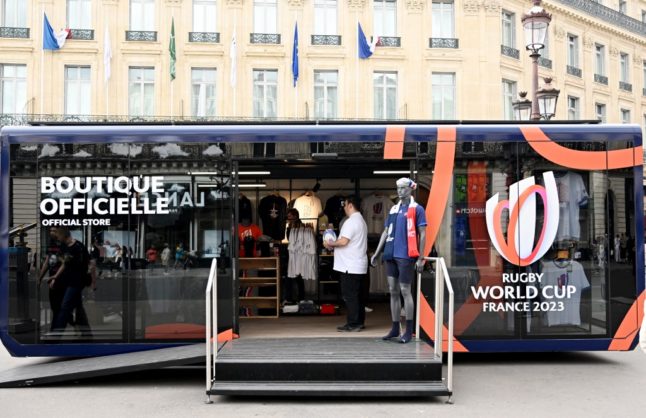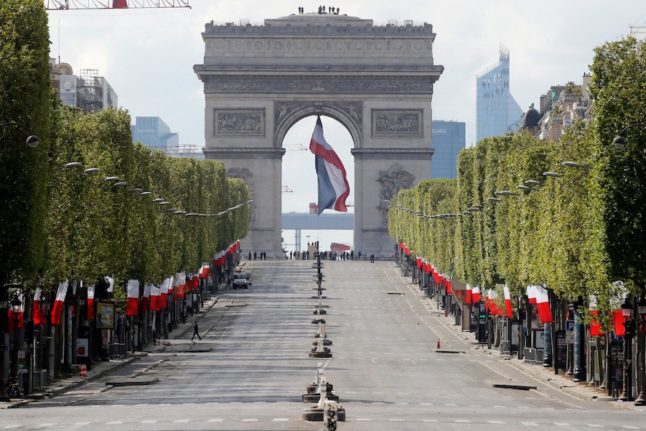The tournament gets underway on Friday, September 8th, with an opening ceremony at Stade de France featuring French actor (and rugby fan) Jean Dujardin, followed by the opening match between France and New Zealand.
It lasts for seven weeks, culminating in the final on October 28th, also at Stade de France. Nine cities will host matches during the tournament – Bordeaux, Toulouse, Marseille, Nice, Lyon, Lille, Saint-Denis, Nantes and Saint-Etienne.
READ ALSO What you need to know about visiting France for the Rugby World Cup
Tickets were mostly snapped up early, but for those who missed out there will be official fan zones in the nine host cities, plus Paris, and bars up and down the country will be showing the games. One of the big aims of the tournament is to grow the game and entice along people who might not previously have watched rugby.
So whether you’re new to the game or a die-hard fan, here are some helpful French phrases to know.
General
Une bière, s’il vous plaît – while spectators at next year’s Paris Olympics might be going thirsty, organisers of the Rugby World Cup have reassured fans that alcohol will be available in all the stadiums during the tournament.
Allez les bleus – a handy all-purpose phrase that means ‘go France’ as the French rugby team (and football team in fact) are known as ‘the blues’.
Allez les gars – come on guys/go team. More general all-purpose encouragement.
Allez putain – the slightly more X-rated version of ‘come on guys’, for when things get really tense.
Le ballon – the ball.
Un essai – a try (or score for rugby newcomers), usually bellowed out as essaiiiiiiiiiiiiiiiiiiiiiii. Scoring one of these gives a team five points.
Une transformation – a conversion. After scoring a try, the team get a chance to ‘convert’ it – ie add two more points – with a kick at goal. The aim is to get the ball over a horizontal bar connecting two very tall poles. Where the try is scored dictates the location of the following conversion kick.
Une pénalité – the other time you’ll see someone getting a free kick at the goal is when they have been awarded a penalty. If they succeed in getting it over the bar, they get three points.
Pénaltouche – sometimes a side that wins a penalty doesn’t go for goal, but rather kicks for the sidelines, because they will get the resulting throw-in. This is, delightfully, known as a pénaltouche.
Merci de respecter le buteur – the player who takes the kick is known as le buteur, and when they’re lining up for their kick attempt you’ll see this sign (thank you for respecting the kicker) which is asking you to be quiet while they take the kick. We’re pretty sure that French grounds just put this up as a joke, as kick attempts are among the loudest part of the games, as opposing fans yell, boo, whistle and generally do their best to distract the player.
Essai de pénalité – a penalty try – these are awarded when foul play prevents a probable try from being scored. These are automatically worth the full seven points of a try plus a conversion.
Un plaquage – a tackle. Rules on this have got stricter in recent years and players can be harshly penalised for any tackle that is judged to be dangerous such as a tackle that targets the head or neck.
Un carton jaune – yellow card. The player is sent to the ‘sin bin’ for 10 minutes before being allowed to rejoin the game.
Un carton rouge – red card. The player is sent off for the rest of the match and his team have to continue with 14 players. They’re usually given for dangerous play and often involve other post-match sanctions too, such as a ban for a certain number of games.
Rules*
Don’t believe what they say, no-one really understands how the highly intricate laws** of rugby are actually applied to the struggling pile of bodies on the pitch. But the complexity – and the fact that they’re constantly changing – mean that fans never run out of things to talk/argue about.
Here’s some phrases you might hear when things get technical:
La mêlée – the scrum
Mêlée spontanée – a ruck. Basically, a heap of bodies that spontaneously forms in the vicinity of the ball after a tackle.
Hors-jeu – offside. Don’t even try to understand rugby’s offside laws. Just insist your preferred side is always harshly refereed on offside, while the shamelessly cheating other side are getting away with being permanently offside. Even when they’re not. Alternatively, bellow HORS-JEU! at every ruck. You’ll probably be right. Especially in a match involving Ireland.
En-avant – knock on. When a player drops the ball in front of themselves. Also used to describe a pass that goes forward. Be prepared for in-depth discussions involving physics at some point during the tournament as fans debate whether a certain try-scoring pass was actually forward, or went forward as a result of impetus. You’ll be astonished how many science professors are also rugby fans.
Un Plaquage haut – high tackle. If a tackle is judged to be too high on the player’s body (ie above the shoulder) it can result in a red card, which can decide the entire outcome of a game. Expect to hear much yelling and swearing from fans if the referee rules that a tackle was too high.
Une chistera – a behind-the-back pass. Usually delivered by a flashy scrum-half, or similar.
L’arbitre – the referee
Putain d’arbitre – *ù0%ing referee. As in most sports, the ref cops for a lot of (mostly good natured) abuse when fans decide that he is blind/paid off by the other team/hasn’t read the rule book.
Arbitre vidéo/TMO – video referee or TMO (third match official) who has the final say after a review of a piece of play on the big screen
Ces nouvelles règles – these new rules. World Rugby loves tinkering with the rules of the game and for this tournament several new rules have been put into place – die-hard fans usually like nothing more than complaining about how ‘these new rules’ are ruining the game.
Celebrations and commentary
Let’s be optimistic and assume that France do well (as the bookies believe they will, les bleus are among the favourites to win the tournament).
Ouiiiiiiiiiiiiiiiiiiiiiiiiiiiiiiiiiiiiiiii – hopefully self-explanatory, a shouted ‘yes’ when things go well, tries are scored etc
Ola – a Mexican wave. A crowd celebration thing that some fun-sponge fans detest. Ignore them, and join in.
Quel essai ! – what a try!
Quelle caramel ! – what a tackle! Nothing to do with confectionery, a ‘caramel‘ is the name for a big-hitting but legal tackle.
Ooooh là là là là la là – Something good / bad is happening / has just happened. Intonation is everything. Pay attention on hearing an excited upnote. Put your head in your hands, on a low, downbeat tone.
Pas de faute … pas de faute – an oft-repeated phrase by tense French broadcasters (we’re looking at you, Dimitri Yachvili) when one team is defending close to their own tryline in a tense match.
On est en finale – we’re in the final. Popular with all types of sports fans in France, find the tune below. You might also hear ‘on est en demi‘ – we’re in the semi final.
Le rond point de la gare de #Vichy investi par les supporters des Bleus. La nuit promet d'être belle ! #FRABEL pic.twitter.com/C8b0Q8m6a9
— Olivier Rezel (@OlivierRezel) July 10, 2018
Na na na na na na na na na na – not actually French as such, but the 90s dance hit Freed from Desire is regularly sung during and after matches so you’re likely to hear its infuriatingly catchy refrain at least once.
Allons enfants de la Patrie – Let’s go, children of the fatherland. France is blessed with one of the world’s best anthems for sporting events. Naturally La Marseillaise is sung before each match that France plays in, but if you’re in the stadium you’ll hear fans spontaneously belting it out at key moments during the match.
Find the full words, tune and translation here.
Odds and ends
Une grève – a strike. This is France, after all, so it’s possible that strike action could hit during the tournament – public transport workers in Paris are already in dispute with bosses over the bonuses they will be paid during the tournament. Strikes can lead to pertubations (disruption) on public transport. You can keep with all the latest strike news here.
L’ovalie – this means the ‘oval world’, referring to the oval-shaped rugby ball and refers to rugby fans in general and more specifically the south-west of France, which is the country’s rugby heartland (in the north, football is more popular).
Rugby treize – er, wrong sport. This World Cup is for rugby union. The slightly different sport of rugby league is referred to a rugby treize in France, because of the 13-person teams (as opposed to 15 in a rugby union team). A fan of rugby league is known as a trieziste. Rugby treize gets less money, attention and TV airtime in France than union, but the game is growing.
*Yes, we know. Rugby has Laws, not Rules…
**See?







 Please whitelist us to continue reading.
Please whitelist us to continue reading.
Member comments